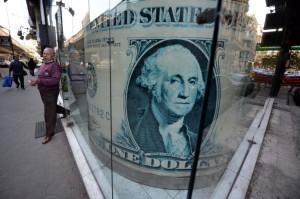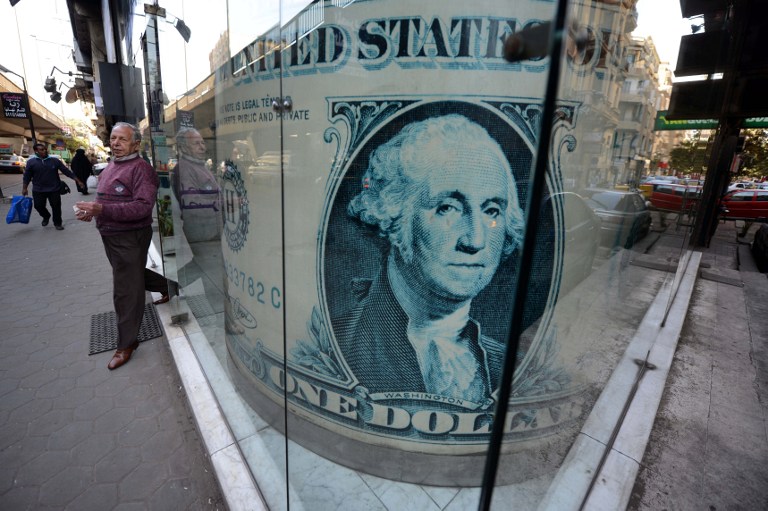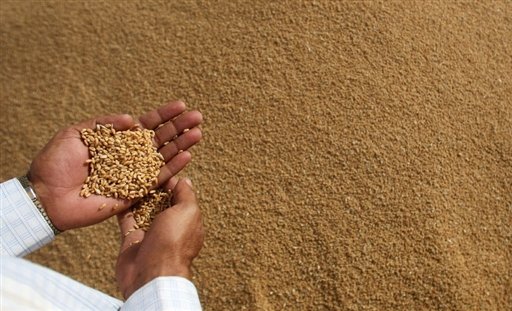
(AFP Photo)
By: Wafaa Abd al-Bari
During the first annual meeting of the “Save Egypt’s Economy” Conference last week, Tariq Hamad, dean of the Business School at Ain Shams University, stated that the best way to close Egypt’s budget deficit would be to limit spending, increase government revenues, combat smuggling, activate real estate taxes and seek both domestic and foreign loans.
This, he said, would prove fruitful in helping to stabilise the country; but, however, would only be successful if all of the country’s political parties and organisations participated in dialogue to help ensure the efficient of the implementation of these measures. Only then, he said, would economic stability be achieved.
Hamad also stated that foreign investment within Egypt had dried up over the last two years, pointing out that the country’s foreign currency reserves had also dropped to $13bn. This, he said, has made it difficult for Egypt to meet its obligations in purchasing essential and necessary goods, which has led to further decreases in tourism. He attributed this to the continuance of widespread protests, clashes, and calls for civil disobedience throughout Egypt, which have put a halt to the country’s economic activity.
Salah Gouda, president of the Economics Studies Centre, also suggested a number of new ways to help close Egypt’s budget deficit, including employing good governance with regards to the country’s natural resources, reassessing the country’s mining laws, incorporating private funds into the public budget, and removing subsidies for factories that consume large amounts of energy, producing products such as cement, steel, fertiliser and uranium.
He added that the value of Egypt’s current fuel subsidies had reached EGP 97bn.
Gouda also suggested that the Export Subsidy Fund (ESF) work to eliminate subsidies for cement exports, and work to take into account the high price of fuel when setting prices for exports of ready-made products. This, he said, would bring in an additional EGP 34bn in steel, fertiliser and cement exports. He added that this should be done in addition to amending natural gas laws, which could also be expected to add an additional EGP 10bn yearly to the country’s revenues. He also spoke of the need to add amendments to the countries real estate tax laws.
Saeed Abd al-Moneim, professor of accounting and taxation at the Ain Shams Business School said that the government had erred when it decided to raise taxes on sales and purchases of plant crops, flour and cement, in addition to calling for increases in customs duties and income taxes.
He added that there existed a need to widen and improve Egypt’s tax base by improving upward prices, re-assessign the structure of Egypt’s tax brackets, and raising tax exemption rates on citizens in a way that took into account current events occurring throughout the country.
Mohamed Abd al-Aziz, also a professor at Ain Shams, called for the government to subsidise and support small-scale development projects, to work harder to encourage and employ the nation’s youth, and to work to convert in-kind subsidies to cash-based subsidies. This would be in addition to decreasing in-kind subsidies for non-essential products, raising wages for low income employees, and raising the value of tax exemptions in a way that matched current rates of inflation. He added that higher rates of investment and increased expansion in project franchises would come naturally after changes were made to the country’s tax code.
Safwat al-Dubari, accounting Professor at the Ain Shams College of Business, suggested that the government put an EGP 10,000 per year cap on wages for this fiscal year, in addition to decreasing wage subsidies. This, he said, would free up EGP 65bn which could then be used to help pay the cost of essential goods for working class citizens without raising taxes or increasing prices. He also suggested limiting payments to private funds, bringing these funds under the jurisdiction of the Ministry of Finance, and working to reopen Egypt’s nearly 4,500 closed factories. This, he said, would help bring both economic and political stability to Egypt.
He also called on President Mohamed Morsi to postpone Egypt’s upcoming parliamentary elections, which are expected to cost EGP 2.5bn, until the end of the current fiscal year when the country is more stable. He also called on the government to postpone expenditures until the country comes out of its current economic crisis.



